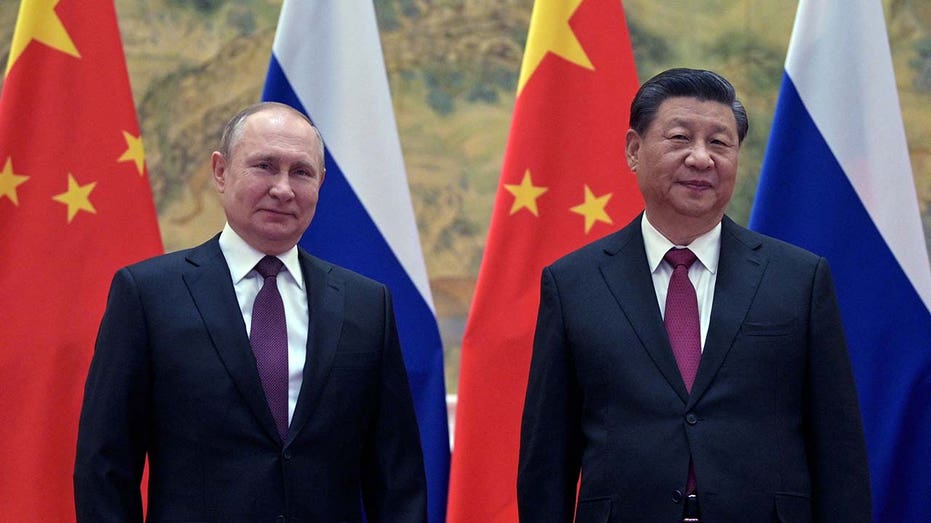Is the Russia-China alliance cracking?
Some Chinese banks are drawing the line on their support for Moscow
Piro on Russian invasion of Ukraine: Wait to see what happens with China
'Fox & Friends First' co-host Todd Piro argues Biden connotes 'weakness' as mainstream media presses him on handling of Russia.
Russia and China have maintained a close working relationship for years, but that relationship appears to be in question after Russian President Vladimir Putin made the decision to invade Ukraine and take on serious economic sanctions.
Two Chinese state-owned banks announced Friday, as reported by Bloomberg News, that they will restrict financing for Russian commodity purchases.
CHINESE BANKS RESTRICT LENDING TO RUSSIA. DEALING BLOW TO MOSCOW

Russian President Vladimir Putin and Chinese President Xi Jinping pose during their meeting in Beijing, on February 4, 2022. (Photo by Alexei Druzhinin/Sputnik/AFP via Getty Images / Getty Images)
Offshore units of Industrial & Commercial Bank of China have stopped issuing U.S. dollar-denominated letters of credit for purchases of physical Russian commodities ready for export, while the Bank of China has also limited funding.
The implementation of those restrictions, which could be temporary, brings into question Beijing's support for Moscow as Western alliances deliver harsh sanctions on Russia. According to Bloomberg, the four largest banks in China have complied with prior sanctions from the U.S. against Iran, North Korea and officials in Hong Kong because they need access to the U.S. dollar clearing system.
"Chinese financial institutions take sanctions compliance seriously," said Ben Kostrzewa, a foreign legal consultant in Hong Kong who once handled U.S.-China disputes and negotiations through the Office of the U.S. Trade Representative. "They don’t want to be sanctioned themselves, they can’t lose access to U.S. dollar transactions, so they are going to have to think about it very seriously -- whatever the geopolitical impact might be."

Ukrainian servicemen walk at fragments of a downed aircraft seen in in Kyiv, Ukraine, Friday, Feb. 25, 2022. ( AP Photo/Oleksandr Ratushniak / AP Newsroom)
For the most part, China has remained tight-lipped in condemning Russia’s invasion of Ukraine. The nation has echoed talking points and claims it respects "all countries’ sovereignty and territorial integrity."
RUSSIA INVADES UKRAINE: LIVE UPDATES
As a key supplier of energy to China, Russia has gone to great lengths to maintain its relationship with its southern neighbor. At times, the two countries have found themselves to be geopolitical allies among disputes with the United States.
In large part, at least for now, China remains a supporter of the Kremlin as recent food and energy deals between the two countries made headlines. Prior to the invasion, Russia struck a deal valued at an estimated $20 billion to supply China with 100 million tons of coal in the "coming years." Earlier this month, China also agreed to purchase Russian wheat. Together, Ukraine and Russia produce almost a quarter of the world's wheat.
Robert L. Wilkie, former undersecretary of defense for personnel and readiness during the Trump administration and visiting fellow at the Heritage Foundation, previously told Fox News Digital that he believed Chinese President Xi Jinping would support Putin if sanctions were levied against Russia.

Russian President Vladimir Putin listens to a journalist's question during a joint news conference with Hungary's Prime Minister Viktor Orban following their talks in the Kremlin in Moscow, Russia, Tuesday, Feb. 1, 2022. (Yuri Kochetkov/Pool Photo via AP / AP Newsroom)
"A lot of the talk about economic sanctions is really a pie in the sky because China is now Russia’s banker," Wilkie said prior to Russia's invasion. "Xi Jinping will back Putin if sanctions from the West come."
The steady relationship between the two nations can be traced back decades to the 1940s and 1950s when Chinese President Mao Zedong worked with Soviet Union Premiers Joseph Stalin and later Nikita Khrushchev.
GET FOX BUSINESS ON THE GO BY CLICKING HERE
Showing the closeness of the relationship, Chinese media reported that Xi and Russian President Vladimir Putin held a telephone call Friday in which they discussed the situation in Ukraine.
It didn’t appear as if Xi asked Russia to stop the invasion or even called it one. Rather, according to the readout, it was noted that Xi reiterated China’s support to Russia and Ukraine to resolve the issue through diplomacy. Putin, the readout noted, had explained the historical context of Russia’s ties to Ukraine and also brought up Russia’s special military operation taking place in the east of Ukraine. China also announced the previous day it was lifting all previous sanctions on Russian wheat imports.
Fox News' Megan Henney, Ben Evansky, and Caitlin McFall contributed to this article.





















